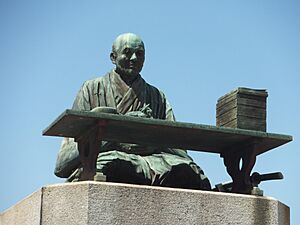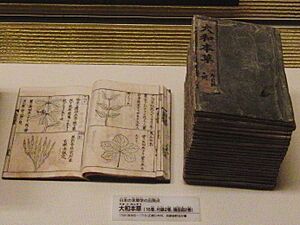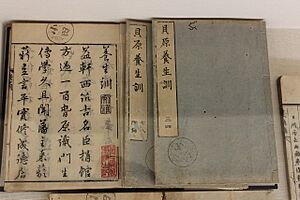Kaibara Ekken facts for kids
Kaibara Ekken (貝原 益軒, December 17, 1630 – October 5, 1714), also known as Ekiken, was a very important Japanese thinker. He was a philosopher and a botanist. This means he studied how people think and live, and also studied plants.
Kaibara Ekken was born into a family that advised the local ruler, called a daimyō, in a place called Fukuoka Domain. When he was 18, he went with his father to Edo (which is now Tokyo). In 1649, he was sent to Nagasaki to learn about Western science. He continued his studies there for several years. Later, he returned to work for the Kuroda family and kept studying in Kyoto. After his father passed away in 1665, he went back to Fukuoka.
Contents
Kaibara Ekken's Big Ideas
Kaibara Ekken made two main contributions to Japanese culture. First, he studied nature by mixing Western science with Neo-Confucianism. Neo-Confucianism was a way of thinking that combined ideas from ancient Chinese philosophy with Buddhist and Daoist beliefs. Second, he made complex Neo-Confucian writings easier to understand for everyday Japanese people.
His ideas about Confucianism and Western science also influenced Shinto, which is Japan's traditional religion. His work was similar to a movement called Kokugaku, which focused on Japanese traditions.
Studying Plants and Nature
Kaibara Ekken's science focused on Botany, which is the study of plants. He also studied Materia medica, which is about medicinal plants and their uses. He was very interested in "natural law," or how nature works.
He became as famous in Japan for his science as people like Charles Darwin are today. He greatly improved the study of plants in Japan. He wrote a very important book called Yamato honzō (which means "Medicinal herbs of Japan"). This book was a major study of Japanese plants. A German expert on Japan, Philipp Franz von Siebold, even called him the "Aristotle of Japan." This shows how important his work in botany was.
Teaching Life Lessons
Kaibara Ekken was also known for writing helpful guides on how to behave. He took the teachings of Zhu Xi, a famous Neo-Confucian philosopher, and turned them into easy-to-read "self-help" books.
As a teacher and philosopher, Kaibara Ekken's main goal was to help people understand and use Neo-Confucian ideas in their daily lives. He wanted these ideas to become a part of Japanese culture. He is well-known for books like Precepts for Children and Greater Learning for Women (Onna daigaku). However, some experts today believe that others might have helped write Greater Learning for Women, even though it was based on Kaibara's teachings.
Published Works
Here are some of the important books Kaibara Ekken wrote:
- Dazaifu jinja engi (History of Dazaifu Shrine).
- Jingikun (Lessons of the Deities).
- Onna daigaku (Greater Learning for Women), c. 1729.
- Shinju heikō aimotorazaru ron (Treatise on the Non-Divergence of Shintō and Confucianism).
- Yamato honzō (Medicinal herbs of Japan), 1709.
- Yamato sōhon (Grasses of Japan).
- Yōjōkun (The Book of Life-nourishing Principles), 1713.
- Taigiroku (The Record of Great Doubts), published after he died in 1714.
See also
- Confucian Shinto
 | James B. Knighten |
 | Azellia White |
 | Willa Brown |




